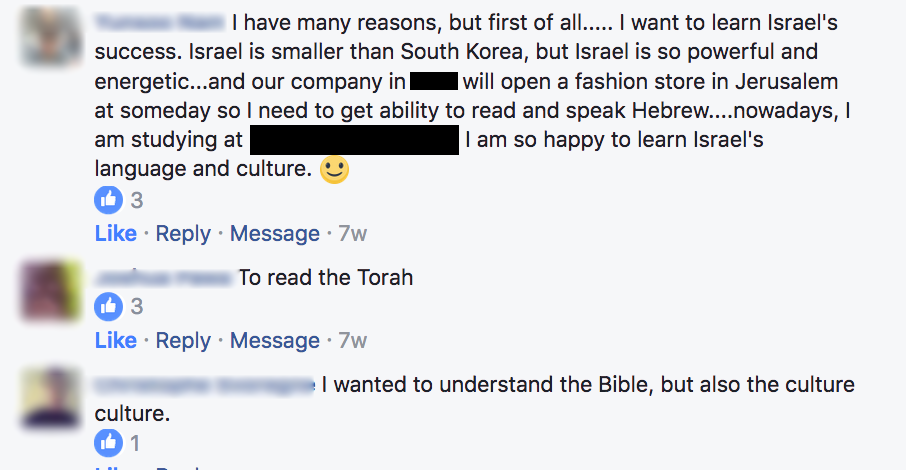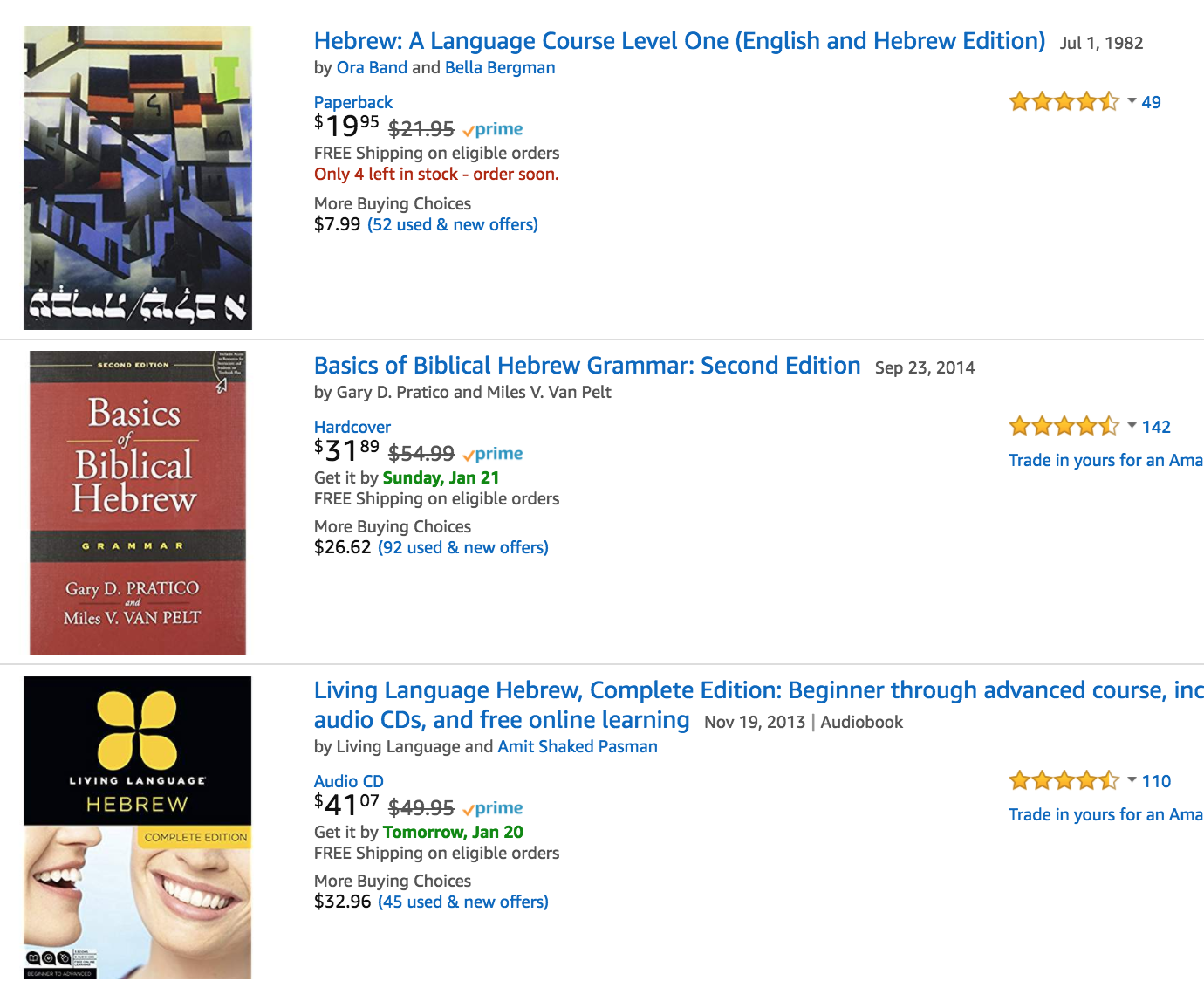Hello Junkies,
People out there will tell you that learning Hebrew is hard. That you shouldn’t do it. And it’s not practical.
Wait. If you even have the slightest in interest, whatever it is, you should learn it. Is it hard? Not so much but who cares? Millions are learning Japanese which is a Category 5 language, according to the Foreign Service Institute. Category 5 means it’s the hardest. Hebrew is Category 4.
Yet, millions are learning a “tough” language and succeeding. You can too.
How?
In this “Learn Hebrew” guide, I will show you how to learn Hebrew and give you a road-map to follow.

Why Should I Learn Hebrew?
Good question!
If you even have just the slightest interest, you should learn it.

When you learn Hebrew, you will discover a whole new culture full of unique traditions and the deep soul of a nation whose roots take us back to the beginning of the human civilization.
Let’s look at some of the reasons why you should learn Hebrew.
1. Hebrew is one of the oldest languages and is still used today. Its history goes back to over 3,000 years.
What does Hebrew sound like? Take a listen to a lesson from HebrewPod101.com (click here to visit), a Hebrew learning course/site that I use.
2. You will be able to read The Hebrew Bible (“Tanakh”) in its original writing. It contains a great number of well-known legends, like “David and Goliath”, “Adam and Eve”, “Jonah and the Whale”, “Sodom and Gomorrah” and many others.
Yes, you can read the English, translated versions, but it won’t be as good. It’s impossible to transfer all the details and peculiarities in translation.
If you want to read the bible in its intended language, learn Hebrew!
3. Israel is a great tourist attraction. Knowing Hebrew will help you to get the most out of your visit. Even though Israel is a small country, it has a large hot desert called the Negev, a ski resort on the Mount Hermon and milder climate in the center of the country. Most importantly, it won’t take you too long to go from one place to another.
Israel is home to the following sites and places:
- Jerusalem. This city is the holy place to all the three Abrahamic religious: Judaism, Christianity and Islam. You can find there the Western Wall, which is the only survived part of the Second Jewish Temple; Nazareth – it is said that here, Mary was told by the angel Gabriel that she was carrying the child of God – Jesus; and Al-Aqsa Mosque, which is one of the holiest sites in Islam. All these places are situated on one hill called Temple Mount (הר הבית – “har habayit”).
- The Dead Sea – the lowest point on Earth with the saltiest water in the world. It was one of the world’s first health resorts.
- Eilat is a resort with breathtaking views, situated at the tip of the Red Sea.
There are many other important cultural and historical places to visit in Israel. You will experience them in all their glory when you learn Hebrew.
4. There are many words of Hebrew origin in other languages. Even in English.
Some of them are names. Here are some popular English names with Hebrew meanings.
- Joseph (יוסף = “he shall add”)
- Toby (טוביה = “goodness of Jehovah”)
- Michael (מיכאל = who [is] like God?
- Abigail (אביגיל = “father of exaltation”)
- and many others.
What are the Best Resources to Learn Hebrew?
If you’re like most learners, you want to know where you can go and learn right now.
What do I suggest?
If you already have something, use that. Otherwise….
A) HebrewPod101.com – The Fastest, Easiest & Most Fun Way to Lean Hebrew (500+ of Audio & Video Lessons by Hebrew Teachers)
Hebrew is an online course for self learners. You get Audio & Video courses across all topics: conversation, grammar, reading, writing and more. You also get new, free lessons every week so they’re always growing and improving.
Very beginner friendly and highly recommended.
You can use their app too.
Click here to visit HebrewPod101.com & start learning right now.
You can go from beginner to advanced and learn to read, speak and understand Hebrew with this resource.
B) Definitely Textbooks. Visit Amazon.com (click here) for Hebrew textbooks and choose whichever has the best rating/price for you.
Don’t think too much. Any start is good enough. Hebrew textbooks are a safe way to start learning.
Any textbook will help you get started with reading, writing and understanding Hebrew.

What Makes Hebrew a Unique Language?

Hebrew is probably one of the oldest languages that is spoken nowadays.
How old? Over 3,000 years.
This language was actually revived, too!
For many decades it only existed in the Bible and texts. People used it only for prayer. Not in their everyday life. Hebrew was considered as a dead language for many centuries.
People started to revive it in the late 19th century and it was fully brought to life after Israel was established in 1948.
The original Hebrew used in the Bible was rather old and had to be changed and modified in order to meet all the needs of the modern life. It couldn’t describe all the new phenomena that emerged during those 3,000 years.
Who revived it? Eliezer Ben-Yehuda, a lexicographer of Hebrew. He was one of the people who had made a huge effort to revive it by adding new words to it, many of which still exist today.
Since Israel is a rather young country (1948) and most of the Jewish people immigrated to Israel from different countries, they have spoken different languages. So, they acquired accents and features of the languages of the countries they used to live in. That’s why there a lot of Hebrew words of German, French, Arabic, Romanian, Polish, Greek and Turkish origin.
If you can speak one of these languages you can easily recognize these borrowed words, with some slight changes and modifications, of course.
What else makes Hebrew unique?
– Hebrew Grammar is Easy
Many linguists consider the Hebrew grammar easy. At least, easier than other European and East-Asian languages.
– Reading Direction
As you may already know, Hebrew is read and written in the direction from right to left.
– Pronouns
There are 10 personal pronouns in Hebrew:
Singular | Phonetics | English | Plural | Phonetics | English |
אני | “ani” | I | אנחנו | “anah’nu” | We |
אתה | “ata” | You (masculine) | אתם | “atem” | You (m) |
את | “at | You (feminine) | אתן | “aten” | You (f) |
הוא | “hu” | He | הם | “hem” | They (m) |
היא | “hi” | She | הן | “hen” | They (f) |
– Gender in Hebrew
Unlike English, Hebrew words are either Masculine or Feminine. There are some simple rules that help distinguish them. For example, most feminine words end with ה (“h”) or ת (“t”):
משפחה (“mishpah’a”) – family מכונית (“meh’onit”) – car
רשימה (“reshima”) – list אמת (“emet”) – truth
There is also a number of irregular words that do not fall under any rule. So you have to memorise them.
– Hebrew verbs
Hebrew verbs are usually based on a three-letter-root (in Hebrew שורש – “shoresh”). The rest of the verb is built upon it. These roots can be also the root of some nouns and adjectives.
Here is an example:
- Root: ש-פ-ט (“sh-f/p-t”); י-ד-ע (“y-d-a”)
Here are some of the words that can be built using the mentioned above roots:
לשפוט – to judge (“lishpot”) לדעת – to know something (“ladaat”)
שופט – judge (“shofet”) ידע – knowledge (“ye-da”)
Hebrew verbs have only three main tenses:
- The Past (עבר – “avar”)
- The Present (הווה – “hove”)
- The Future (עתיד – “atid”)
Let’s take a look at an example of a verb (masculine, singular) inflected in all the three tenses:
Root: ש-ח-ק (“s-h’-k”)
The Past | The Present | The Future |
הוא שיחק (“hu sih’ek”) | הוא משחק (“hu mesah’ek”) | הוא ישחק (“hu yesah’ek”) |
He played | He is playing | He will play |
The gender of the verb changes depending on who does the action. For example:
- אני משחק (“ani mesah’ek”) – I am playing
- אתה משחק (“ata mesah’ek”) – You (m) are playing
- את משחקת (“at mesah’eket”) – You (f) are playing
- הוא משחק (“hun mesah’ek”) – He is playing
- היא משחקת (“hi mesah’eket”) – She is playing
- אנחנו משחקים (“anah’nu mesah’kim”) – We are playing
- אתם משחקים (“atem mesah’kim”) – You (plural, m) are playing
- אתן משחקות (“aten mesah’kot”) – You (plural, f) are playing
- הם משחקים (“hem mesah’kim”) – They (plural, m) are playing
- הן משחקות (“hen mesah’kot”) – They (plural, f) are playing
– Hebrew Adjectives
Hebrew adjective are inflected according to the gender and number of the item/s they describe. Let’s have a look at these examples:
- משפחה גדולה (mishpah’a gdola) – a big family
- שולחן גדול (“shulh’an gadokl”) – a big table
- ילדה טובה (“yalda tova”) – a good girl
- ילד טוב (“yeled tov”) – a good boy
– Sentence Structure
Hebrew sentences are usually like in English. First there’s the subject, then verb, then object.
- Subject-Verb-Object.
- I ate an apple.
- I is the subject.
- Ate is the verb.
- Apple is the object.
- I ate an apple.
Hebrew verbs are conjugated by gender, number and person.
- אני מדברת אנגלית. (“ani medaber anglit”) – I speak English.
- אנחנו מבקרים חברים. (“anah’nu mevakrim h’averim”) – We are visiting friends.
What Do You Need to Know About Hebrew Culture?
The Hebrew culture is a very ancient and interesting one. It’s full of traditions, deep knowledge and understanding of the life and the world as a whole.
It was also influenced by the surrounding nations.
1. Ancient Hebrew History and Culture.
The history of the Hebrew people is mostly described in the Hebrew Bible “Tanakh”. It tells about the ancestors and the further growth and development of the nation. Abraham is considered to be the first Hebrew and the father of the nation.
The ancient Hebrews often lived as nomads who had to move from place to place in search of green pastures for their cattle. They had no permanent land or place of living. Some of the people described in the Bible who lived such a lifestyle were: Abraham, Isaac, Moses, David.
Later on the Kingdom of Israel (United Monarchy) was formed in around 1050 and 930 BCE. The kingdom occupied some parts of what is now modern Israel and Jordan. Some of the United Monarchy’s kings were David and Solomon.
After then the territory was conquered by others, such as the Assyrian Empire (722 BCE), The Babylonians (586 BCE), The Greeks (332 BCE), The Romans (63 BCE).
2. The Gola (Diaspora)
For over 2,000 years the Hebrew nation lived separately in different parts of the world. As there was no temporal authority to lead the nation, the different communities were usually organized under rabbis. They lived under the rules provided in the Bible. During all these years their religion and culture was mainly preserved in the Talmud and rabbis’ commentary.
The Medieval Christian period was extremely difficult for the Jewish nation; they were living under constant fear of being subject to special regulations and taxes, as well as frequent outbreaks of murderous persecution and forced conversion.
The situation was much better in Muslim countries, but nevertheless they had some limitations, couldn’t participate in national live, had to pay special taxes and suffered from discrimination.
3. Modern Israel
After Israel was established many Jewish people came back to Israel to unite and re-establish their country. Each of them brought a small part of another culture – Romanian, Italian, German, French, Iranian, Russian and so on. This kind of life among other nations had a strong influence on the modern Hebrew culture.
Did you know that many Israeli people over 50 years old can speak at least one language other than Hebrew? That is because they or their parents have immigrated from another country.
Various borrowed traditions still exist in Israel. One good example is the Henna or Mehendi ceremony. This tradition is especially popular among Jews whose ancestors came from Eastern countries. The ceremony is held a few days before the wedding.
Modern Israel is a highly developed country and has a significant importance in the world’s economy. The country is a religious one, the whole country celebrates its national holidays and events. They pay much attention to preserve the Jewish culture.
Is Hebrew Hard To Learn?

You might have already noticed Hebrew differs a lot from English
That does not mean you should worry. Yes, it is different. But, learning Hebrew is much easier than you may think. All you have to do is learning it in the right way and get all the necessary tools and techniques to make it easier.
There is a great number of facts about Hebrew that will help you to understand it more easily. I am going to give you some of them so that you see that it’s not as difficult as it seems.
Hebrew Language Facts!
Here is why you can learn Hebrew easily.
1. There are only 22 characters.
2. After you learn even a small number of “roots” (as described in part 2) you get some understanding of a greater number of words. One root serves as the base for many other words (verbs, nouns and adjectives). Getting acquainted with one root will help you recognize other words having the same root and even create words of your own.
3. You will be surprised how many Hebrew words you already know, especially if you can speak other languages than English. Here are some examples.
- Words related to cars and sports:
- ברקס (“breks”) – brakes; דשבורד (“deshbord”) – dashboard; פלאג (“plag”) – plug; פדלים (“pedalim”) – pedal; פאנצ’ר (“pancher”) – puncture; אנדרדוג – (“anderdog”) – underdog; אופסייד (“ofsaid”) – offside.
- Animals:
- ג’ירפה (“girafa”) – giraffe; היפופוטם (“hipopotam”) – hippopotamus; קואלה (“koala”) – koala; פינגווין (“pingwin”) – penguin; קרוקודיל (“krokodil”) – crocodile; קנגורו (“kengeru”) – kangaroo.
- Fruit and vegetables:
- בננה (“banana”) – banana; לימון (“limon”) – lemon; מנגו (“mango”) – mango; אבוקדו (“avocado”) – avocado.
- Other words:
- בנק (“bank”) – bank; טלויזיה (“televiziya”) – TV set / television; ג’ינס (“jins”) – jeans; טישרט (“tishert”) – T – shirt; טרקטור (“traktor”) – tractor; מרקר (“marker”) – marker; אינטרנט (“internet”) – internet; אינציקלופדיה (“entziklopedia”) – encyclopedia; גיטרה (“gitara”) – guitar; יוגורט (“yogurt”) – yogurt; ברבקיו (“barbique”) – barbeque; בלון (“balon”) – balloon.
This is only a small portion of the many words that you can already understand in Hebrew.
4. You can easily know the gender of the Hebrew nouns by its ending (ה and ת for feminine). This is not like in German, where you have to learn by heart the gender of each and every noun.
5. The word order is the same as European languages.
6. There are many Hebrew words in English too. For example, jubilee, hallelujah and bagel.
7. Most of the Hebrew sounds are similar to English. There are only a few new sounds:
- ח – het – is similar to H in to word ‘Hotel’, but pronounced more harshly.
- ר – resh – Is the Hebrew ‘R’ sound. This one is different from the English ‘R’ sound which is less defined.
How Can I Learn to Write the Hebrew Alphabet?
- How To Learn The Hebrew Alphabet in Under 1 Hour
- You can check out my lesson here.
The Hebrew writing system differs a lot from English and other European languages, because it has a consonantal alphabet. A consonantal alphabet mostly uses consonants and few vowels. There are vowel sounds in Hebrew but they are represented with the help of a special sign system called “Nikkud”.
Let’s make it easier for you. Take a look at the following example:
Here we have the Hebrew verb “to play” לשחק.
This word consists only of four consonant letters, L, S, H’ and K. However, the word is pronounced “lesah’ek.” We add three more vowels to the word when we say it. These three vowels are actually there, but they are represented by the “Nikkudot.” The little dots under the letters.
This is how the Hebrew verb “to play” looks like with the “Nikkudot”: לְשַׂחֵק (“lesah’ek”)
Here is a table which shows all the Hebrew vowel marks and the vowels they represent:
Type | Marks |
A-type | אָ אַ אֲ |
E-type | אֵ אֶ אֱ |
I-type | אִ |
O-type | אֳ אֹ |
U-type | אֻ |
Silent E | אְ |
This is not as difficult as it seems. After you learn these sound you can easily read Hebrew.
You will need these marks only at the beginning of your learning. After practicing you will get used to the words and not need them.
The “Nikkudot” are not used in everyday life in Israel. Not even in books, brochures, signs, or anything else. You can find them only in children’s books, dictionaries, the Hebrew Bible and in Hebrew learning material.
Final letters
In Hebrew, there are five letters that have a different form depending on the positionwithin the word.
Letter | English | Initial/middle position | Phonetics + Translation | Final position | Phonetics + Translation |
כ/ך | K or H’ | עכשיו | (“ah’shav”) – Now | מלך | (“meleh’ ”) – King |
מ/ם | M | שמחה | (“simh’a”) – Happiness | שמים | (“shamaim”) – Sky |
נ/ן | N | נחש | (“nah’ash”) – Snake | יומן | (“yoman”) – Diary |
פ/ף | P or F | פנים | (“panim”) – Face | מרתף | (“martef”) – Basement |
צ/ץ | TZ | צחוק | (“tzh’ok”) – Loughter | מרץ | (“Mertz”) – March |
What Are Some Common Hebrew Learning Mistakes to Avoid?
Learning Hebrew is an exciting journey. But, like any language, it has some common mistakes that can be easily avoided. All you have to do it to know what exactly you should be aware of.
Here are the most common mistakes made by Hebrew learners.
1. Confusing letters.
There are a few similar sounds that have two different letters expressing it. I know, this might sound strange, especially to a non-Hebrew speaker, but, after all, everything is pretty simple.
These sounds are: T, H’, K and A. Let’s see the example below to make everything clear:
Letter | Example | Pronounced | Letter | Pronounced | Example | |
Sound ‘T’ | ט | טוב | “tov” | ת | “toda” | תודה |
Sound ‘A’ | א | ארגז | “argaz” | ע | “ananim” | עננים |
The letter are pronounced exactly the same!
You might be thinking “how should I memorize which one to use?” Don’t worry there are a few tricks that help you to know when you should use each of them.
ט and ת:
- Words related to water (drop, dew) are always written with ט:
טיפה (“tipa”) – a drop; שיטפון (“shitafon”) – flood; טל – (“tal”) – dew.
- Most of the borrowed words that are initially written in English with “t” will be written with ט, and those written with “th” will receive ת in Hebrew:
Orthodox – אורתודוקסי (“ortodoksi”); theory – תאוריה (“teoria”); statistics – סטטיסטיקה (“statistika”); mathematics – מתמטיקה (“matematika”).
- We always write ט after the letter צ.
להצטלם (“lehitztalem”) – be photographed; להצטדק (“lehitztadek”) – apologize;
- כ is always followed by ת and ק is always followed by ט.
כתב; כתש; קטל; קטן.
- Words denoting family members are always written with א.
אמא (“ima”) – a mother; אחיין (“ah’yan”) – a nephew; סבתא(“savta”) – a grandmother.
This is not the full list of all the rules and tricks, there are many others out there.
2. Writing and reading direction
This sounds silly, but don’t forget the fact that Hebrew is written and read from right to left.
This not only concerns the text itself, but also any book, notebook or brochure written in Hebrew. Just remember to open it when the spine is on the right.
3. Binyanim
Hebrew verbs are conjugated according to specific patterns, called “Binyanim.”
There are seven basic conjugations and a very rare eighth, as well as some irregular verbs.
Active | פָּעַל (“paal) |
פִּעֵל (“piel”) | |
הִפְעִיל (“hif’il”) | |
Reflexive | הִתְפַּעֵל (“hitpael”) |
Passive | הֻפְעַל (“huf’al”) |
פֻּעַל (“pual”) | |
נִפְעַל (“nif’al”) |
This might be a tricky thing to learn and understand. All you have to do is take your time and be patient.
4. Agreement
The verbs in the Hebrew sentence should always agree with their subject in number, gender and person.
If you make a mistake by making wrong agreement between the words of the sentence you may end up sounding really funny and people will not understand you. This is not that difficult after you overcome this challenge, just keep practicing.
5. Aiming for Perfection
Please don’t be one of those people that say “I want to get it just right. If I’m going to do it, I want to make it perfect.”
No! No! No! No!
Don’t try to make everything sound perfect when you start learning the language. Let yourself make mistakes and try to correct them in a fun way.
Hebrew is a rather flexible language. Unlike English, the word order is more or less changeable, when necessary. Just take a look at the example below:
- העוגה הזאת מאוד טעימה. – (“hauga hazot meod teima”) – This cake is very delicious.
In this sentence both the Hebrew and the English variants have the same word order.
- העוגה הזאת טעימה מאוד. – (“hauga hazot teima meod”) – This cake is very delicious.
Here the Hebrew adjective “delicious” (טעימה) stends before the Hebrew “very” (מאוד). It actually sounds like this: “This cake is delicious very”. It’s not correct to talk like this in English, but it’s totally fine to do this in Hebrew.
** Remember that not all the parts of the sentence can be changed places like this.
What’s The Best Way To Learn Hebrew?

First, you should have a reliable resource. For example, I suggest HebrewPod101 and their audio/video lessons. But, don’t listen to me. Any resource is a good enough start.
Once you have a program, you should…
1. Set a goal
Ask yourself: “Why do I want to learn Hebrew?”
Maybe you want to read the Hebrew Bible. Maybe you want to move to Israel. Or, you just want to study a new language because you find it exciting and challenging.
After you know why you want to learn Hebrew, you will know what to learn.
- If you plan on traveling, you should learn Hebrew travel phrases.
- If you want to speak Hebrew, look for conversational lessons.
- If you want to read the bible, you should look for those lessons specifically.
2. Make a plan
- When will you learn Hebrew?
- How will you learn? What will you use?
- Where will you learn
- For how long will you learn?
- What will you do on days when you can’t concentrate?
- When will you stop learning?
Try to create a plan for yourself, determine the hours when you are able to study, find the necessary learning material for you and start learning.
Don’t make a plan to study for 5 hours in 1 day.
Make it easy like 10, 20 or 30 minutes a day.
This will make a huge difference. The most important is consistency and the desire to learn.
3. Engage in New Ways of Learning Hebrew
Don’t be afraid to try out new methods.
Each time you begin feeling bored and uninspired, try something new and change your study routine.
Tired of your flashcard app? I am too.
- Then, listen to audio lessons and repeat out loud.
- Want to write? Get some Hebrew text and copy it out word for word.
4. Make it Fun
What do you like to do? Do you like going to the gym? Going to restaurants? What can you talk about for hours?
Take into account your hobbies and interests during the studying process, adjust it according to your personality and what makes you happy.
Let’s say you are interested in music. Find songs that you like in Hebrew. Search for the words you already know and try to recognize them both visually and aurally, translate the vocabulary that is new for you and enjoy the process. Read texts and various content in Hebrew about your favorite bands and musicians.
What if you’re interested in gym? Make a list of all of the muscles in English and learn the Hebrew words for them.
Another helpful tip is to learn jokes in Hebrew.
Try to understand to various cultural phenomena that are expressed in them, since jokes often give us an amazing overview of the various peculiarities and the overall way of thinking of the nation.
5. Talk with native speakers
This is one of the best ways to study and learn Hebrew. It gives you the chance to try out the skills you already have and acquire new ones in an informal and a friendly way, without the actual ‘studying’ atmosphere. You also get speaking and listening practice, which is essential in leaning a language.
You hear the REAL Hebrew that is spoken in Israel. You learn the little, subtle pronunciations that books won’t teach you. You learn the rhythm of speaking.
Plus, you discover more information about their culture and lifestyle.
You may already have a friend or a family member that speaks Hebrew, try to ask them for help. Another option is to find a native Hebrew speaker in some language learning community, forum or blog.
It’s also helpful to speak to other non-natives who are learning Hebrew. Why?
It is always easier and more fun to study a new language with friends. You can compare yourself to them. Sometimes, the best way to learn is to observe other’s mistakes. You can correct each other’s mistakes and make the process enjoyable.
6. Learn more Hebrew words
Having a rich vocabulary is a key to success.
Try to learn at least 5 to10 new words each day. Make sure you include nouns, adjectives and verbs. You can make sentences or small dialogues with this words – this will help you to memories them faster. After you create sentences and situations of your own with these words your brain can remember them more easily.
I suggest you get the HebrewPod101 word of the day.
7. Read books
Find the Hebrew translation of your favorite book and read it.
You are already familiar with the events described in the book. You don’t have to read the whole book from beginning to end because it might be too difficult for a beginner, a paragraph or even a small paragraph will be enough. You can have the translation of it in your native language.
This tip will help you to overcome your fears of failure and boost your self-esteem.
8. Listen to Hebrew songs and watch Hebrew movies (with subtitles)
This will help you to get used to hearing the Hebrew language. You don’t have to understand all the lyrics of the song. You can just turn it on in the background while you do your stuff.
Watching Hebrew movies or TV shows with English subtitles is another great way to get used to hearing Hebrew. You get used to its pronunciation, accent, rhythm, intonation.
Of course, you won’t learn Hebrew with music and movies alone, since it can’t replace actual studying, but it is a great boost for you in your way to your goal.
Now, you are ready to learn Hebrew.
Just follow the tips inside this guide and you will be fine.
Hope you enjoyed this!
– Linguajunkie
P.S. If you honestly want to learn Hebrew, I recommend HebrewPod101. You get 500+ audio/video lessons by Hebrew teachers, tons of study tools, apps and vocabulary lists. This is a friendly online learning course.



I want to learn Hebrew language